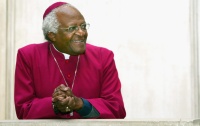BlackDoctor.org
(Black PR Wire) Archbishop Emeritus Desmond Tutu, a towering figure who helped bring an end to apartheid in South Africa, has passed away in Cape Town. He was 90.
“The passing of Archbishop Emeritus Desmond Tutu is another chapter of bereavement in our nation’s farewell to a generation of outstanding South Africans who have bequeathed us a liberated South Africa,” President Cyril Ramaphosa said in a statement early Sunday.
“Desmond Tutu was a patriot without equal; a leader of principle and pragmatism who gave meaning to the biblical insight that faith without works is dead.”
The passionate advocate for freedom headed the country’s Truth and Reconciliation Commission in the 1990s, a grueling inquiry that investigated crimes during the apartheid era. It was widely seen as a crucial healing step during South Africa’s transition from apartheid to democracy. The TRC became a model for similar commissions in other parts of the continent.
Tutu was also the first Black bishop of Johannesburg and later became the Anglican Archbishop of Cape Town. He was known for working tirelessly for racial justice and LBGTQ rights.
UN Secretary-General António Guterres called Tutu “a towering global figure for peace & justice.”
Former President Obama described him as “a moral compass” and “universal spirit.”
Tutu, an Anglican clergyman, used the pulpit to preach and galvanize public opinion against the injustice faced by South Africa’s Black majority.
Tutu, the first Black bishop of Johannesburg and later the first Black archbishop of Cape Town, was a vocal activist for racial justice and LGBTQ rights not just in South Africa but around the world.
In 1990, after 27 years in prison, Nelson Mandela spent his first night of freedom at Tutu’s residence in Cape Town.
After the fall of the apartheid regime, with Mandela leading the country as its first Black president, Tutu headed the Truth and Reconciliation Commission, which laid bare the terrible truths of white rule.
“His contributions to struggles against injustice, locally and globally, are matched only by the depth of his thinking about the making of liberatory futures for human societies,” the Nelson Mandela Foundation said in a statement.
Tutu’s legacy surpasses borders and “will echo throughout the ages,” U.S. President Joe Biden said in a statement Sunday.
"We were blessed to spend time with him on several occasions over the past many years,” Biden said on behalf of himself and his wife, Jill. “His courage and moral clarity helped inspire our commitment to change American policy toward the repressive Apartheid regime in South Africa.”
Biden was outspoken about apartheid when he traveled to the country as a senator in 1976, when he said he refused to be separated from his Black colleagues.
Tutu also campaigned internationally for human rights, especially LGBTQ rights and same-sex marriage.
“I would not worship a God who is homophobic,” he said in 2013, launching a campaign for LGBTQ rights in Cape Town. “I would refuse to go to a homophobic heaven. No, I would say, ‘Sorry, I would much rather go to the other place.’”
Tutu said he was “as passionate about this campaign as I ever was about apartheid. For me, it is at the same level.” He was one of the most prominent religious leaders to advocate LGBTQ rights — a stance that put him at odds with many in South Africa and across the continent as well as within the Anglican church.
A seven-day mourning period is planned in Cape Town before Tutu’s burial, including a two-day lying in state, an ecumenical service and an Anglican requiem mass at St. George’s Cathedral in Cape Town. The southern city’s landmark Table Mountain will be lit up in purple, the color of the robes Tutu wore as archbishop.

